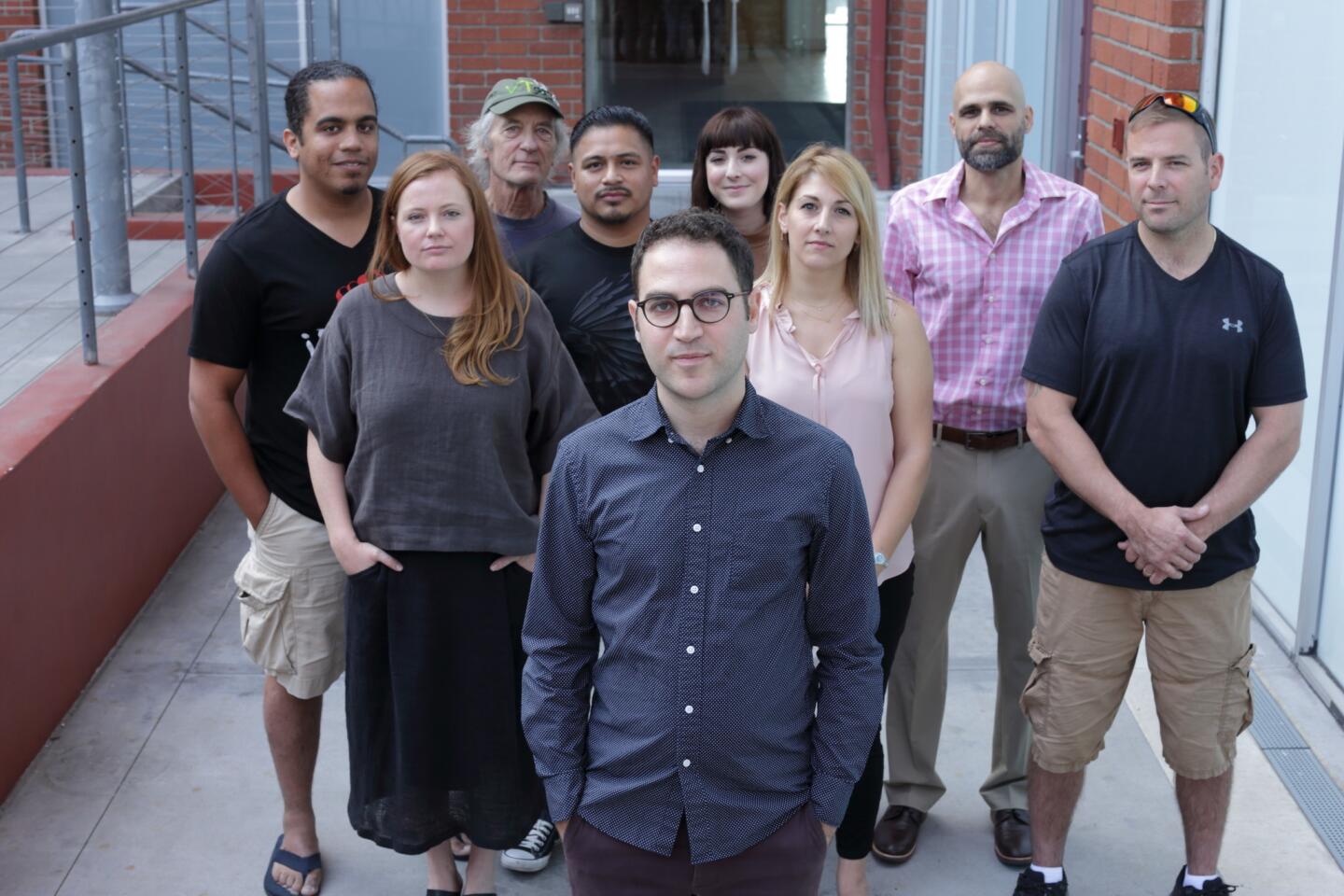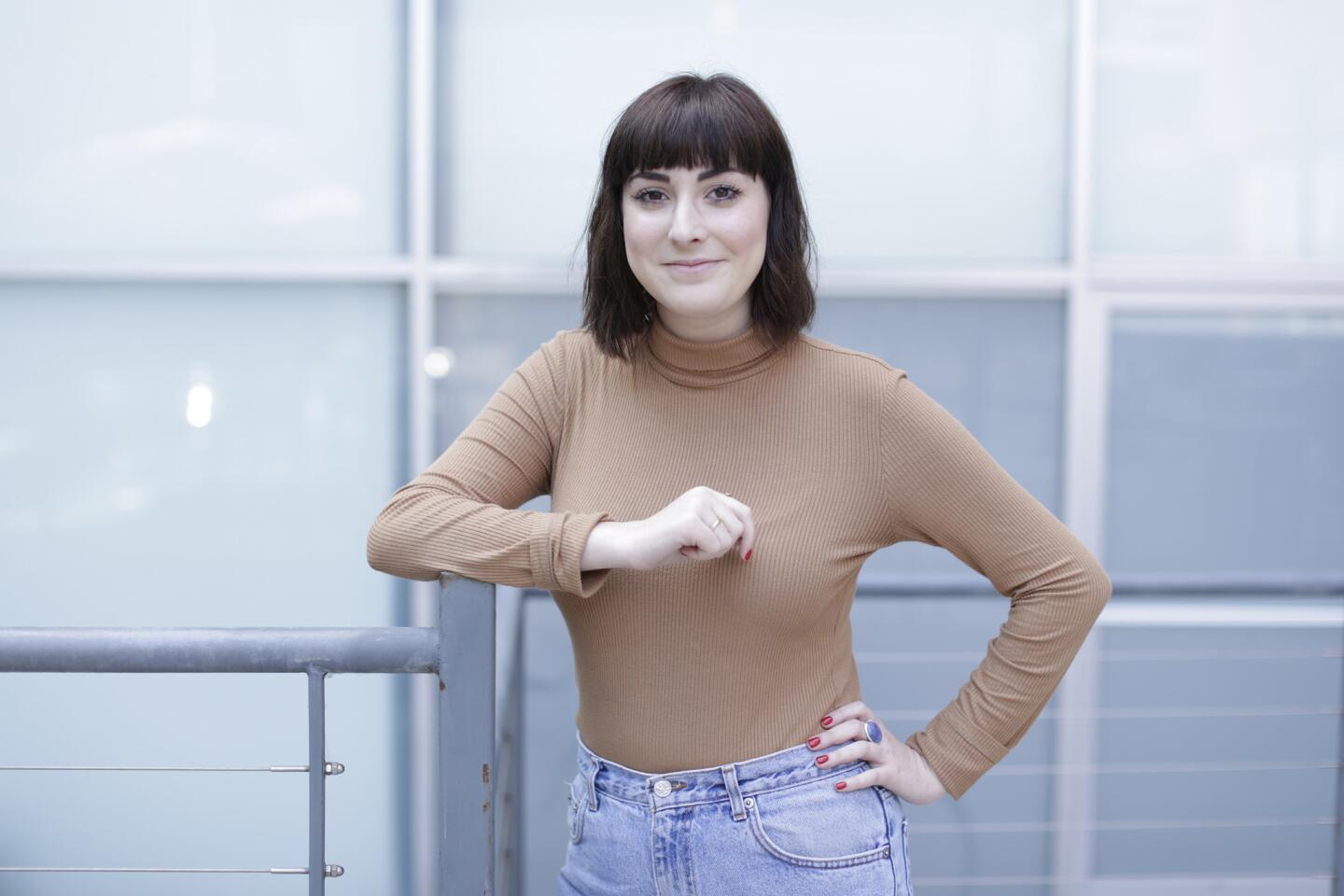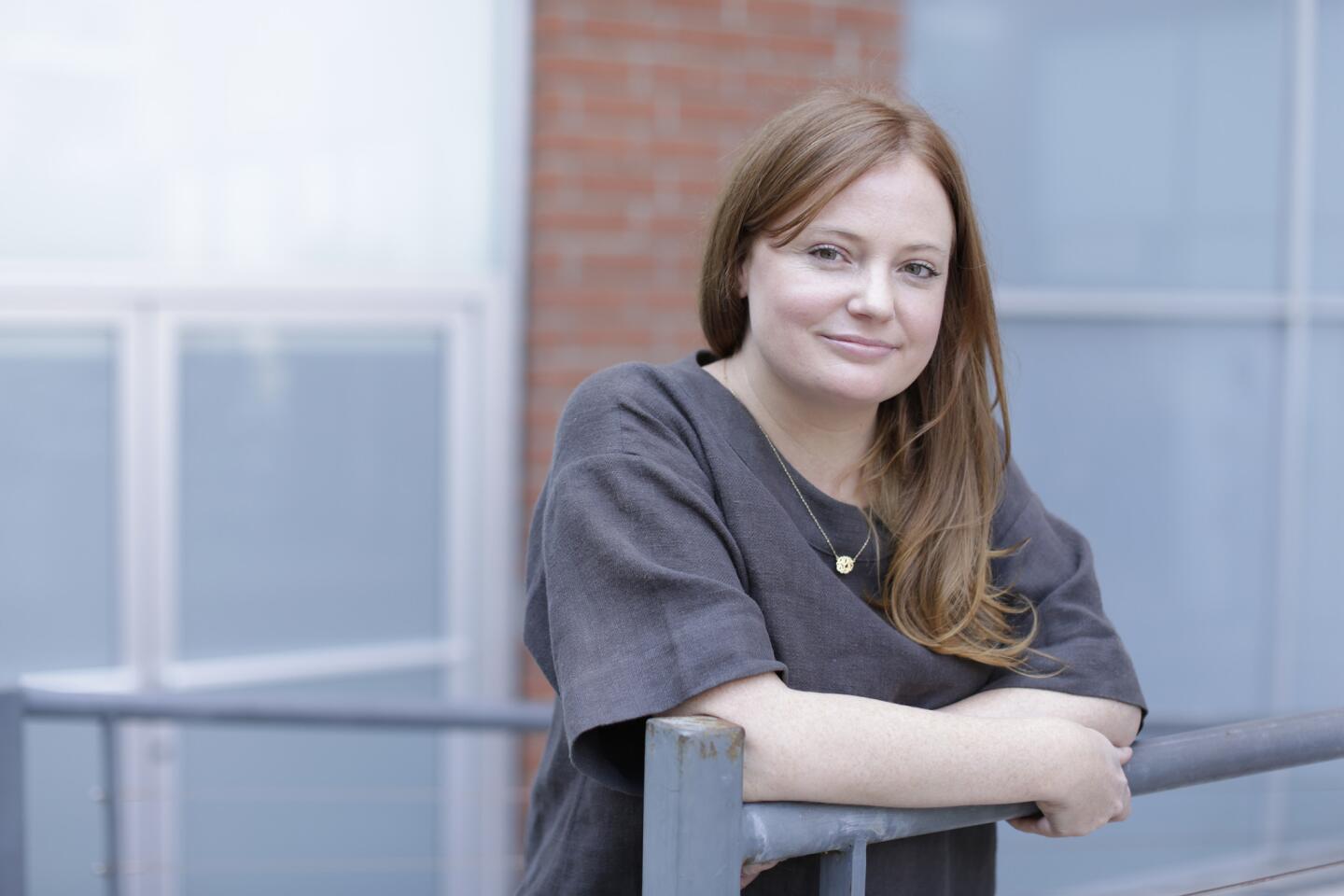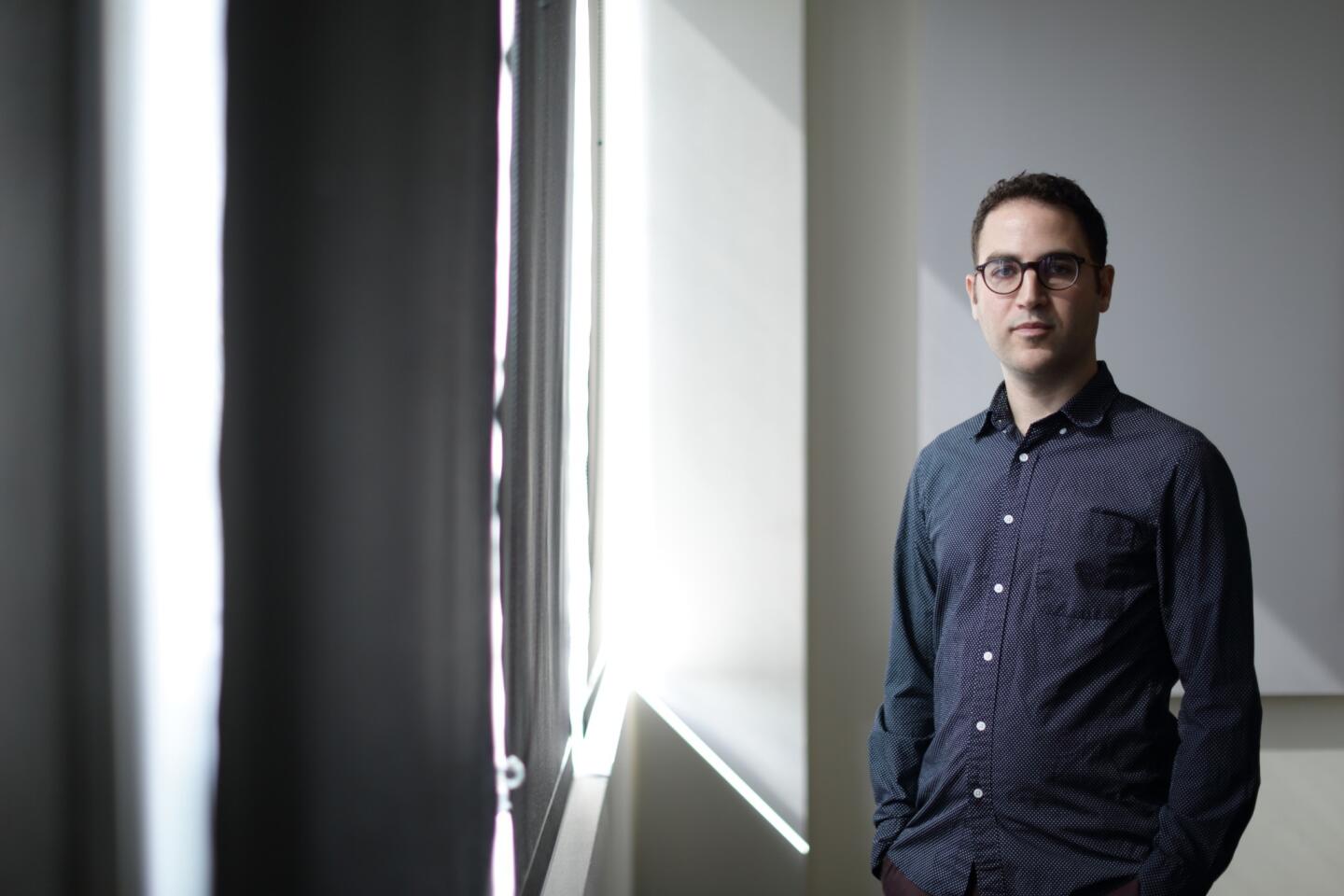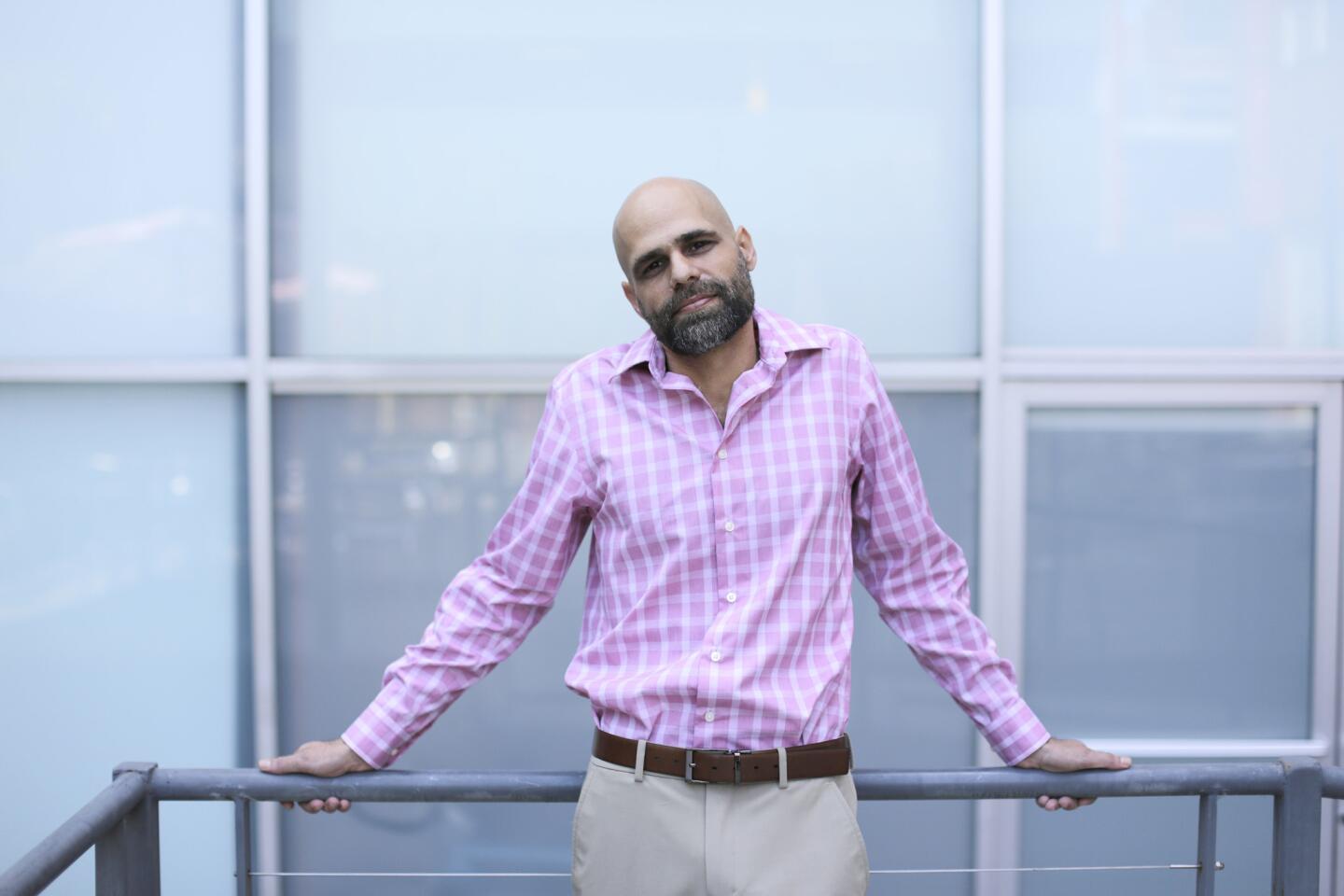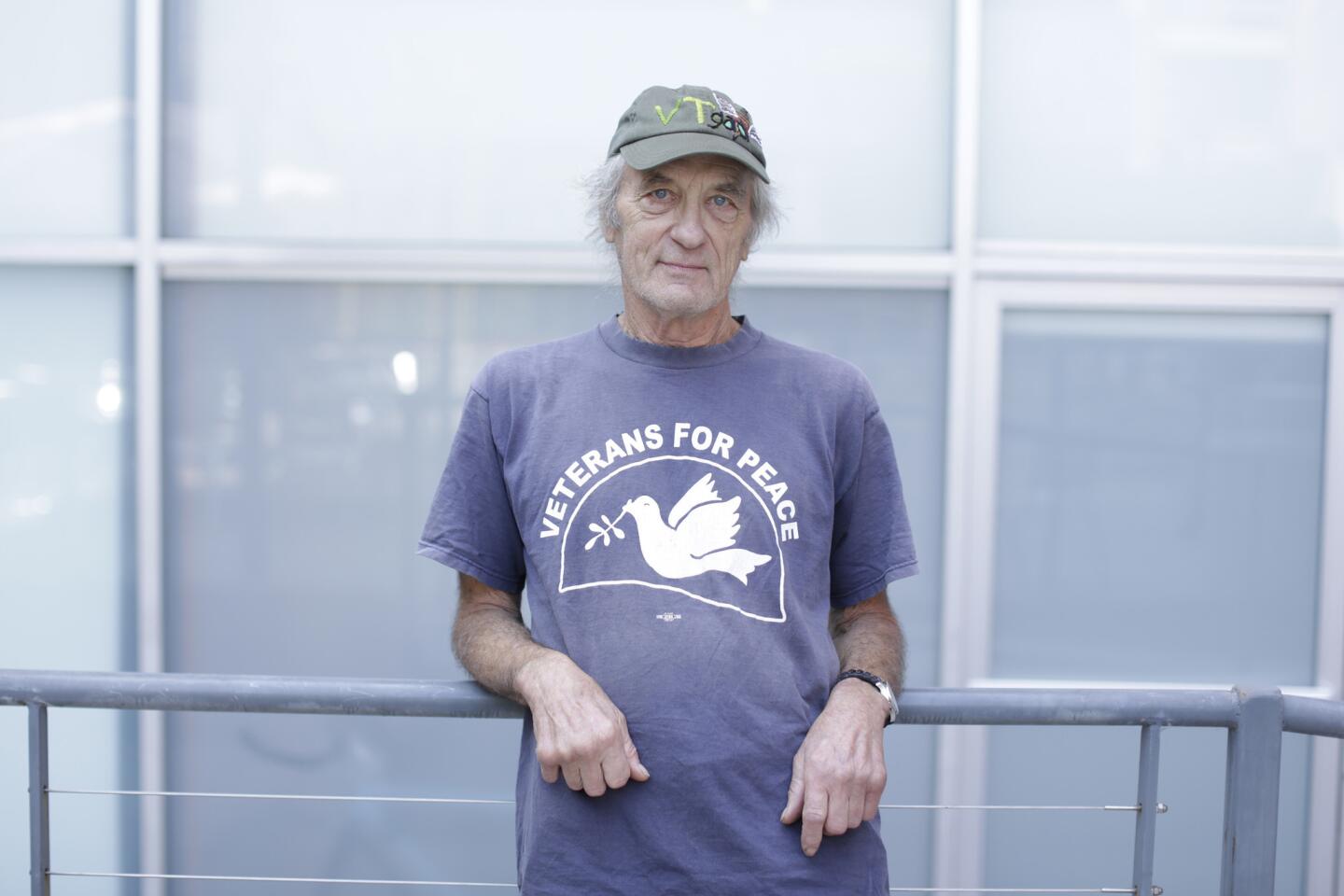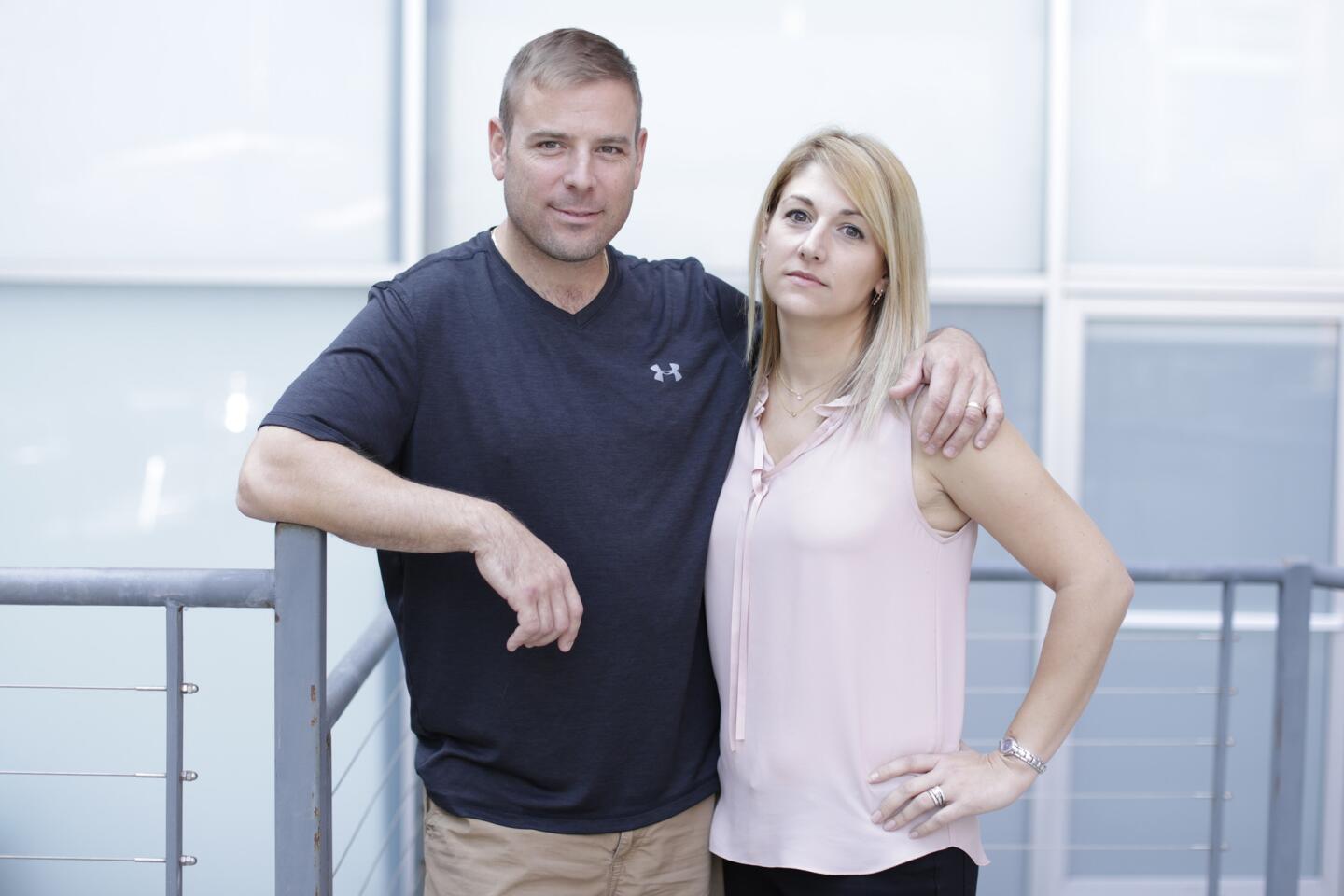‘11/8/16’ looks back at a shocking, emotional Trump vs. Clinton election day — and the divides that remain
- Share via
On the morning of Nov. 8, 2016, 20-year-old Hana Barkowitz, a Kent State University student with bright eyes and bleached blond hair, bubbled over with optimism. The Pittsburgh native was about to vote in her first presidential election, and her passion for her candidate, Hillary Clinton, was unsinkable.
A documentary crew captured her exhilaration as Barkowitz, president of the Ohio school’s College Democrats, spent the morning door-knocking around campus, then co-hosted a nonpartisan watch party to cheer as the polls came in.
But as the states slipped away from Clinton and Donald Trump’s presidency crystallized into reality, disbelief and despair registered on her face. She wondered how anyone could still laugh at a time like this. Stunned, she confessed feelings she can’t quite remember almost a year later, from a night that now feels like a blur: “I just can’t believe it’s this close.”
Nearly a year after Trump’s election, both sides think they’re losing »
Barkowitz is one of 16 diverse Americans who share their hopes, dreams, triumphs and heartbreak in “11/8/16,” a cinematic time capsule of a day with a historical impact that won’t fully register for years to come.
It’s a hard day for many of the film’s subjects to revisit, even 11 months later. On a recent fall afternoon, ahead of its Los Angeles premiere, seven of the film’s stars have made the journey to Southern California to be a part of the arguably more difficult conversation: Where do we go from here?

They gather in the courtyard of producer-distributors the Orchard, shake hands, make polite small talk. Those who are present are meeting for the first time. Only a few of them have seen the film and know who’s who — and, therefore, whose vote helped seal the fate of their fellow Americans.
Tom Erdmann, a family-minded small business owner from Franklin, Mass., with an easy grin, didn’t pack the “Make America Great Again” sports cap he wears throughout the documentary, much to the relief of his wife and fellow small business owner Gina. They greet Adrian Ojeda of Miami, who they discover also voted for Trump.
Tom beams in joking relief as Gina sits more reservedly at a nearby table. She’s joined by New Yorker Sierra Kos, who they’ll later learn had a very different election day experience, riding a roller coaster of emotion at the end of a 600-day campaign as the head of Hillary Clinton’s video team.
Leaning against a railing a small distance away is Jesus Ruiz, a community organizer from San Jose who has seen the film. He’s doing an admirable job of masking the awkwardness of the situation as an invisible gulf separates him — a Deferred Action for Childhood Arrivals (DACA) recipient and a “Dreamer” who came to the States from Mexico at the age of 4 — from the folks whose preferred candidate put his future in this country directly in jeopardy.
One year after the election, we ask the stars of “11/8/16”: How do you feel about the future now? »
Expanding on his previous film “11/4/08,” which focused on mostly liberal reactions to President Obama’s election, producer-curator Jeff Deutchman has mounted a comprehensive survey of the U.S. at a far more fraught moment of political, social and economic conflict. “I didn’t want to do another movie about intra-left questions,” said Deutchman. “11/8/16,” instead, is “an attempt at reckoning with the country at large.”
Fifty filmmakers were dispatched to 27 states to document election day subjects across a spectrum of experience, age, industry, background and party affiliation. And though not everyone made the final cut, the result is a tapestry of disconnected lives united in a moment in time that gives the viewer a peek into the colliding, overlapping and often conflicting issues concerning Americans across the country today.
The film opens the day with Sikh taxi driver Amrit Palsingh, a pro-Clinton supporter in Queens, N.Y.; listens to the economic anxieties of West Virginia coal worker Eric Hayhurst; spends time in Dora, Ala., with Anthony Ray Hinton, a wrongfully convicted former death row inmate overjoyed to exercise his restored right to vote; and follows Utah mom and housewife Calene Van Noy as she stumps for Independent Evan McMullin.
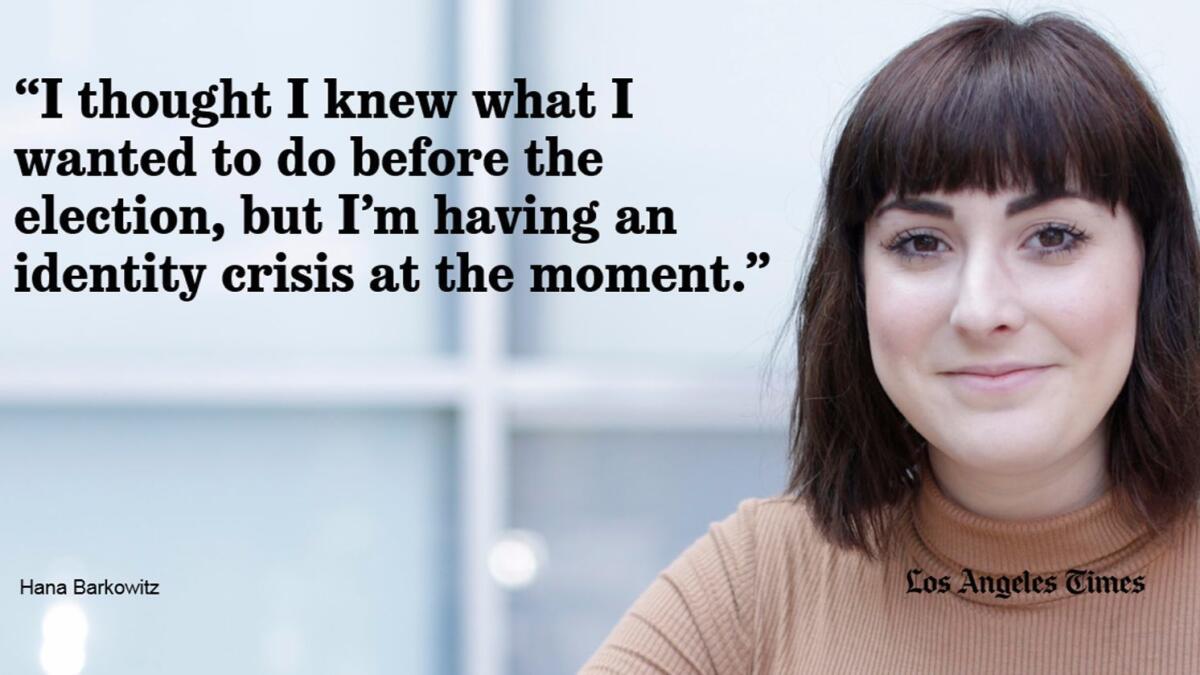
A few things have changed since November for Barkowitz, now a college senior. She’s 21; her blond hair is dyed brown. Since the election she’s interned in Washington, D.C., and started a podcast, but she has also taken a step back from political life on campus.
“I thought I knew what I wanted to do before the election, but I’m having an identity crisis at the moment,” she said, sitting in an office suite high above Sunset Boulevard. The spark she felt just a year ago boosting for Clinton has faded. She’s even considered a move to Europe after graduation.
“Every day I grow more and more wary of living in the United States,” she said. “I also feel guilty about that. Do I want to stay and fight and help to better the cause and the community? If I stay, will I get my rights stripped away as a woman, and as a Jewish woman?” She paused. “Is it worth it in the long run?”
Trepidation is a sentiment shared by many of her fellow documentary subjects. None feel it more immediately than Ruiz.
“I feel… overwhelmed,” he said and exhaled. “I have friends and family, like myself, that are DACA recipients and a lot of them are attorneys, they’re teachers, they’re counselors — they have careers that help other people, and for all of that to be ripped away is tough.”
His work with the grassroots nonpartisan group PACT-SJ features in the film, which captures the anxieties of fellow Dreamers as they realize what a Trump win means for the future.
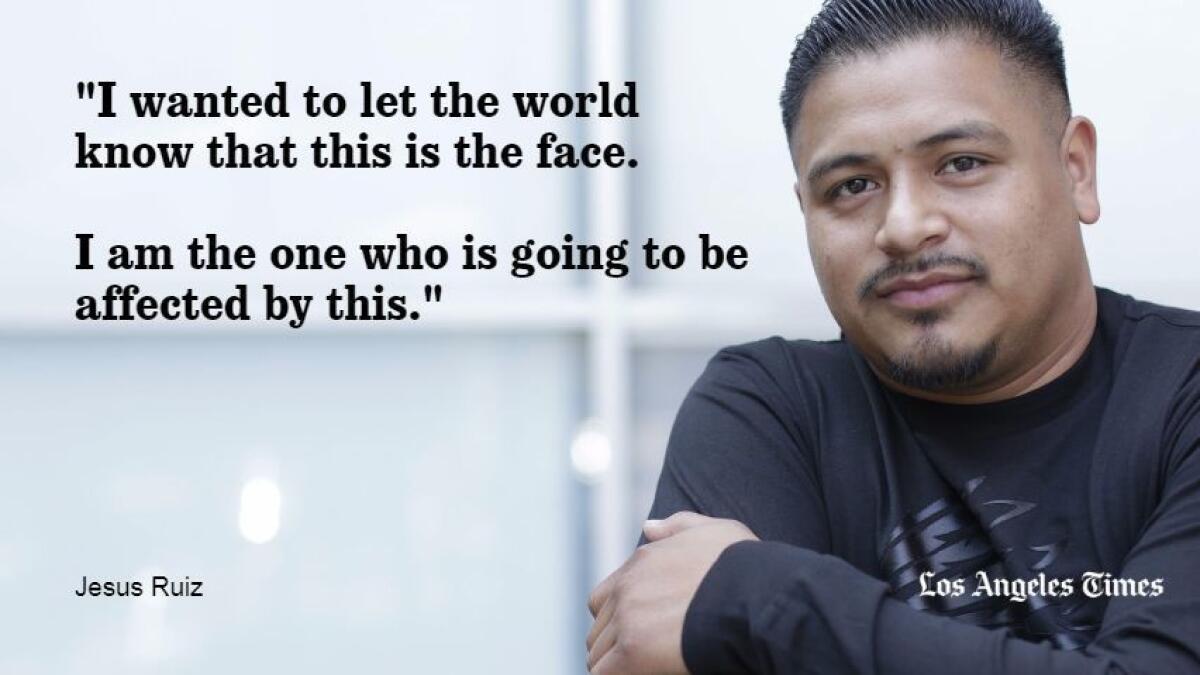
“The fear is there every day, of publicly coming out and saying I’m a DACA person,” said Ruiz, who agreed to be in the film to bring wider visibility to his community. “I wanted it to be out there how frightening this election was to a lot of people in my position. There’s a dominant narrative of immigrants being criminals. That’s not what we are. We’re doctors, we’re lawyers, we’re attorneys, we’re judges. I wanted to let the world know that this is the face. I am the one who is going to be affected by this.”
Ojeda applauds Ruiz’s strength and leadership in the film, and is inspired by the conversations they’ve struck up in person. Like many of the film’s subjects they share quite a bit in common, from their political activism to a shared distrust of Clinton to a focus on engagement and empathy.
Once an Obama voter, Ojeda followed Ron Paul into the Republican Party in 2012. While Ojeda, who serves as a Miami Dade County Republican Executive Committee member, does not regret voting for Trump, he does admit he’s not fully at ease with the president’s treatment of military personnel and veterans.
“It’s been a mixed bag for me. My main thing is letting people know what’s going on with the veterans in this country, and their struggles, because we’re really struggling right now,” he said, praising what the Trump administration has done for veterans’ healthcare options. Ojeda, however, voiced his disapproval of Trump’s policy to ban transgender people from the military.
“I’ve served with everyone from all walks of life,” said an emotional Ojeda. “Everyone deserves the same rights. I’m just speechless, to be honest. To outright ban a group of people from serving — they’re actually willing to offer their lives for the freedom and liberty of everybody, and you’re going to say, ‘No, we don’t want you’?”
“I voted against Hillary,” he emphasized. “Most people don’t realize that the election was won because people were not pro-Trump, but anti-Hillary.”
Landscaper, vegan and local Liberty Union politician Boots Wardinski, 74, echoed the sentiment. He lives happily off the grid in Newbury, Vt., where “11/8/16” finds him celebrating small victories as a third party candidate in his state’s lieutenant governor race.
“I still can’t believe that Trump is our president,” said Wardinski, who calls both candidates “abominable.” “Trump is going to make things worse for a lot of people. I think Clinton would have made things better for some people in the U.S., but I think she would make things worse for the rest of the world, and I think that should be of equal concern to us.”
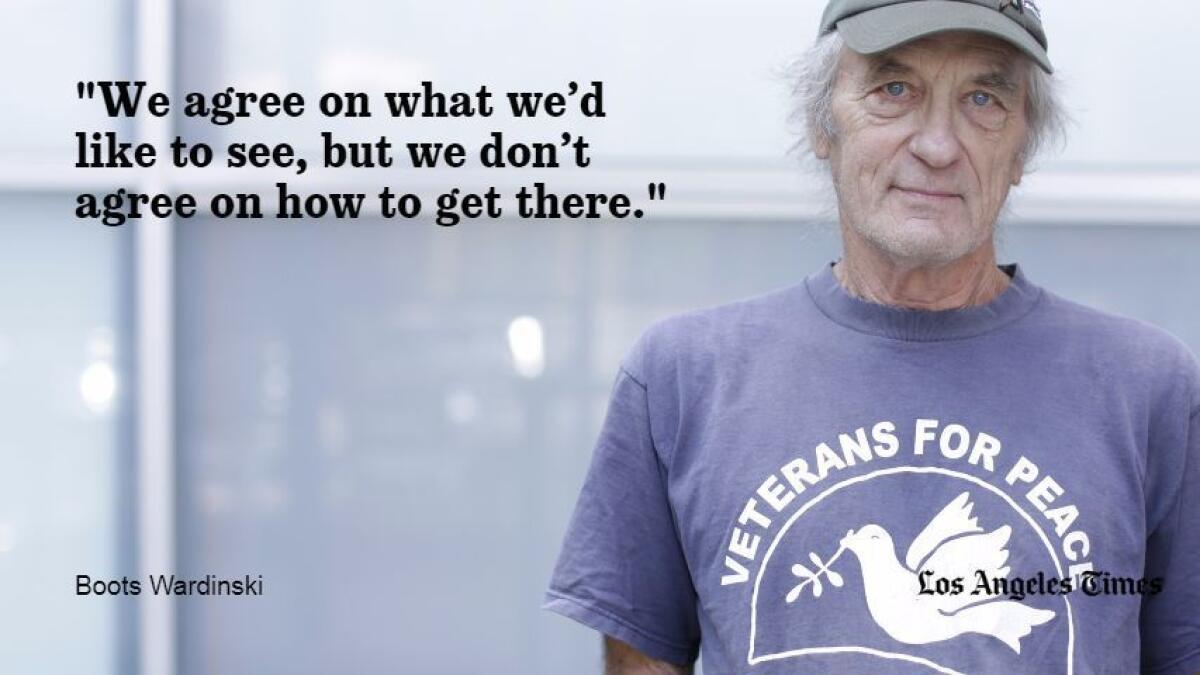
Adamantly opposed to both Trump and Clinton, he’s been having “enjoyable” discussions with his fellow film subjects, even if no one will budge on where they stand. “We agree on what we’d like to see,” Wardinski said with a smile, “but we don’t agree on how to get there.”
He admitted that he didn’t understand why so many pro-Clinton supporters cried on Election Night until he spoke with a female friend. “I’m a privileged white guy. I am! My life hasn’t been impacted negatively but I know that a lot of people’s lives have been affected, and I don’t like it.”
Moments after a conversation turned heated with one of her peers, Gina Erdmann sighed. “And we were getting along so well…”
“I still think we made the right decision,” she said. “I don’t regret it.” Trump may have “orange skin and stupid hair” and a troubling history of sexual misconduct allegations, but Clinton’s past was enough to close Erdmann off to the Democratic candidate. “I don’t feel like I hate a lot of people, but I literally hate her.”
Trump and the Republican platform hit a lot of targets important to the couple, who have young children at home. They report that business has been good in the year since the election. “I think the economy is rising,” said Tom. “I think it’s a direct result of a Republican Party getting into office. I think because of the change we’re starting to make money again and we’re starting to recoup our economy, and I think if a Democrat had gotten in we would have just fallen farther and farther in the hole.”
Of all the subjects in “11/8/16,” which also include Los Angeles Times assistant managing editor of politics Christina Bellantoni and radio journalist Dave Davies of WHYY in Philadelphia, Sierra Kos was the closest to the process. The memories are still vivid, and discussing them at length brought back a flood of emotion for the filmmaker, whose election day was captured by “Bombay Beach” director Alma Ha’rel.
“It’s impossible for me to describe how viscerally painful it is every hour knowing that this country that I love so much elected someone who does not see women and people of color as equals,” Kos said. “I’m much more aware that as a woman, people probably don’t see me in the way that I thought. And that changed in an instant.”
Through Kos, the film takes the viewer up close into a Clinton camp that felt buoyant until far too late in the evening, when the election results left them stunned on the floor of New York City’s Javits Center. “I’m sure that I was naïve,” Kos said. “In the film it’s obvious that I did not think it was possible for us to elect him.”
Kos now works with Hardpin Media, a multimedia company created by former Obama and Clinton video creators. The one word she would use to describe her feelings about the future? “Scared,” she said, taking a deep breath. “But I try to feel hopeful.”
More to Read
Only good movies
Get the Indie Focus newsletter, Mark Olsen's weekly guide to the world of cinema.
You may occasionally receive promotional content from the Los Angeles Times.
